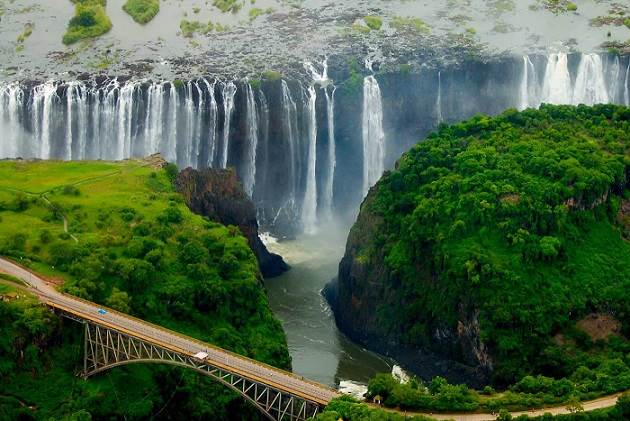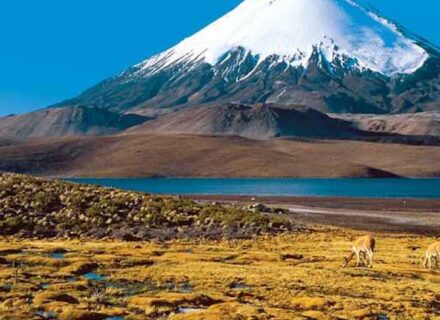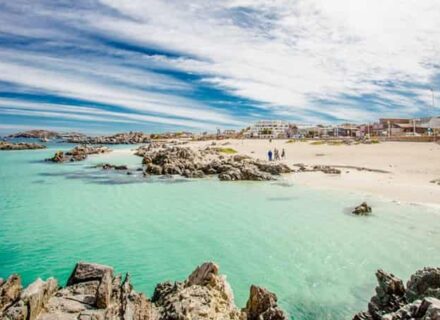Getting to Zimbabwe
Zimbabwe is a landlocked country in southern Africa, lying between the Zambezi and Limpopo rivers. It shares borders with South Africa, Mozambique, Botswana and Zambia.
- London to Harare is about a 13-hour flight
- Los Angeles to Harare takes around 1 day
- Cape Town to Harare takes around 3.5 hours
- Sydney to Harare is about an 18-hour flight
- New York to Harare takes approximately 17.5 hours
Main airport
in Zimbabwe
Zimbabwe has a total of 21 airports with only three servicing commercial flights. The main international airport in Zimbabwe is the Robert Gabriel Mugabe International Airport (HRE), which is around 15km from Harare’s centre.
Geography &
landscape of Zimbabwe
In the heart of Southern Africa, Zimbabwe rests on a high inland plateau with a beautiful mountain region to the east. The highveld landscape is filled with enchanting vistas, mysterious caves, flowing rivers and the world’s largest waterfall and man-made lake. Add in the remote mountainous region on the eastern side and nowhere can compete with the raw beauty of this African gem.
Culture, religion
and etiquette
The population of Zimbabwe is mostly Christian with 75% identifying as Protestant, 8% identifying as Roman Catholic and 8% as other denominations of Christianity. Around 1.2% of the population identify with other religions such as Islam, Muslim or traditional African beliefs, and approximately 6% of the population in Zimbabwe have no faith.
Zimbabwe has a strong cultural hierarchy where age is in correlation with respect, and elders are presumed to be beacons of knowledge. When you are visiting Zimbabwe, always show the utmost respect to the elderly and greet people older than you first. Greetings are usually done with a handshake and a ‘how are you?’.
Zimbabweans believe that education is of prime importance with now 91% of children being literate. The importance of family, including the extended family, is a fundamental value in Zimbabwean culture. There is no translation for the word ‘cousin’ in Zimbabwe – extended family members are referred to as brothers and sisters. Extended families living together is now much more prevalent in the rural areas, and less so within the cities.
Socially, it is deeply frowned upon if you don’t marry and have children. Having lots of children, especially in rural areas, is seen as very positive. Zimbabwe is generally a patriarchal society with men holding most of the decision-making power and providing for the family.
Top tip!
Keep small change in your purse, so that you are ready for tips.
Languages spoken in Zimbabwe
Zimbabwe is a multilingual country with 16 official languages – Chewa, Chibarwe, English, Kalanga, Koi-san, Nambya, Ndau, Ndebele, Shangani, Shona, Sign Language, Sotho, Tonga, Tswana, Venda and Xhosa. The most widely spoken languages in Zimbabwe are English, Ndebele and Shona with around 70% of the population speaking Shona as their first language.
Capital city of Zimbabwe
Harare
The capital city of Zimbabwe is Harare. Perched in the high plateaus of Zimbabwe’s central highlands, Harare is a vibrant city with a distinctly laid-back vibe. Sample the fine-dining scene, the unique bars and the charming cafes. Explore the historical relics, the fascinating museums and the country’s most reputable art galleries. This modern city is not just skyscrapers and office blocks, Harare is also green. The broad streets are decorated with exotic plants, and pretty parks and botanical gardens are peppered all over the city.
Visas for Zimbabwe
To enter Zimbabwe, most nationals will require a visa and every person will need at least six months remaining from the date of entry. Most visitors use the visa on arrival service when entering Zimbabwe; however, visas can also be obtained at a Zimbabwean embassy or online at https://www.evisa.gov.zw/home. Visitors typically get issued a 30-day visa.
The following countries do not need a visa to enter Zimbabwe if the stay is within three months: Angola, Antigua and Barbuda, Aruba, the Bahamas, Barbados, Belize, Botswana, Cayman Islands, Cyprus, the Democratic Republic of the Congo, Eswatini, Fiji, Ghana, Grenada, Jamaica, Kenya, Kiribati, Lesotho, Madagascar, Malaysia, Malawi, Maldives, Malta, Mauritius, Montserrat, Namibia, Nauru, Saint Kitts and Nevis, Saint Lucia, Saint Vincent and the Grenadines, Samoa, Seychelles, Singapore, Solomon Islands, South Africa, Tanzania, Tonga, Trinidad and Tobago, Turks and Caicos Islands, Tuvalu, Uganda, Vanuatu and Zambia.
Visitors from Mozambique can stay for up to 30 days without a visa and visitors from Hong Kong can stay for up to 6 months. If you are working (including volunteering) in Zimbabwe for over 30 days, you will need to obtain an employment visa.
If you are also visiting neighbouring Zambia, you can obtain a KAZA visa for USD 50, which allows multiple entries into both countries.
Vaccinations & travel health
The CDC and the WHO advise for the following routine vaccinations to be up to date when visiting Zimbabwe: Measles, Mumps & Rubella (MMR), Tetanus, Diphtheria & Pertussis (TDAP), Chickenpox, Shingles, Pneumonia, Influenza, meningitis and Polio. They also recommend the following vaccinations for travel to Zimbabwe: Hepatitis A, Hepatitis B, Typhoid, Cholera, Yellow Fever and Rabies.
Malaria is present in Zimbabwe, so we advise travellers to consult their GP for antimalarial medicine and make sure that you are well-stocked with DEET mosquito repellent.
All travellers will need to present a yellow fever vaccination upon entering the country if you have come from a region at risk.
Is it safe to drink tap water in Zimbabwe?
We don’t recommend drinking tap water in Zimbabwe. Some areas are safer than others, but to be sure it’s best to stick to bottled water.
Electricity and plugs in Zimbabwe
The plugs and sockets in Zimbabwe are of type D, and G. Type D has three round pins in a triangular shape, and type G has three straight pins in a triangle shape. The standard voltage in Zimbabwe is 220 V, and the frequency is 50 Hz.
Emergency calls
We always advise our passengers to save the relevant telephone numbers in case of an emergency. The most important ones to note in Zimbabwe are:
Zimbabwe country code – +263
International access code – 00
Ambulance service – 999
Emergency police service – 995
Fire service – 999
Travelling as a single woman in Zimbabwe
One the whole, Zimbabwe is a safe country for solo travellers. Locals are used to seeing backpackers and are usually helpful if you need them. Zimbabweans are well-known for being very friendly and hospitable. It is quite common for women to travel up and down the country alone, so people are generally used to solo female travellers.
However, in Zimbabwe, it is not common to see females alone in bars. In many bars (aside from tourist bars) women who are there alone are usually considered to be sex workers. To avoid attracting this kind of attention, only visit local bars in groups.
As when travelling anywhere in the world, take the necessary precautions, keep your wits about you and use your common sense. Here are a few tips for travelling solo in Zimbabwe.
- Always hike with a group
- Keep any valuables, including money hidden
- Don’t drive alone in the remote wilderness
- Dress conservatively
- Don’t walk alone at night
- Only drink alcohol in moderation
Wifi and internet access in Zimbabwe
In the larger cities you will find that wifi is available in most hotels, restaurants and cafes; however, the more rural you travel, the less likely it is for you to find a good connection. Many towns also have internet cafes and centres, which charge around USD 2 per hour.
Time zone in Zimbabwe
Harare is 2 hours ahead of London (GMT), 10 hours ahead of Los Angeles (PST) and 7 hours ahead of New York (EST). Zimbabwe follows Central Africa Time (CAT) and does not switch to Daylight Savings Time. Visit timeanddate.com to calculate the time difference from your current location.
Getting around Zimbabwe
Taxi
Taxis generally operate using a meter, and it’s best to arrange them through your hotel. You can also hire a taxi for the day to tour the city, which will cost around USD 50. Zimbabwe doesn’t use Uber, but it does have GTAXI, a similar taxi-booking app which is easy to use and gives great prices.
Train
National rail services in Zimbabwe operate between the major destinations including Victoria Falls, Harare, Mutare and Bulawayo. Most trains are sleepers which provide you with bedding and come in 1st class, 2nd class and economy.
Bus
There are two types of buses in Zimbabwe – Express and Local. Express buses run to a specific schedule where you’ll need to buy tickets beforehand – Citylink and Pathfinder are popular companies. Local buses, however, are usually found in the town centres and wait until they are full before leaving.
Car Hire
Hiring a car is a popular option for travelling around Zimbabwe. Most of the major roads, particularly between cities, are in good condition however the same can’t be said of the countryside. Finding fuel in remote areas can also become a problem.
History of Zimbabwe
The first people who inhabited the country were the Sans in 200 BC. After the decline of Great Zimbabwe in the 13th century, the remaining Bantu, Shona, Nhuni and Zulu tribes came together to create the Rozwi state, encompassing over half the landmass of the country. This lasted until 1834 when the Ndebele warriors invaded it. Here they established their own kingdom.
In 1850, the British conquered the country and named it Rhodesia. It later became Southern Rhodesia, and Northern Rhodesia was what we now know as Zambia. In 1923, European settlers voted for Southern Rhodesia to be a self-governing colony, and after World War II, Northern Rhodesia (Zambia) voted for independence. Southern Rhodesia (Zimbabwe) remained as a self-governing colony of the British.
In 1970, Rhodesia became a republic. During this time, conflicts between the black and white populations continued. Laws were passed, giving rights to white people only. The white minority controlled the government resisting the black peoples demands for their rights, which lead to war. When the war ended, the white Prime Minister Ian Smith remained, but the power was transferred to the black majority in 1978.
1980, there was a multiracial election which resulted in naming Robert Mugabe president. The country became independent during that year and changed its name to Zimbabwe.



